
Protecting our planet: The sport and sustainability series | sportanddev.org
How can sport be part of the solution? We kick off a seven-part series on sport and sustainability. The climate crisis is becoming ever […]




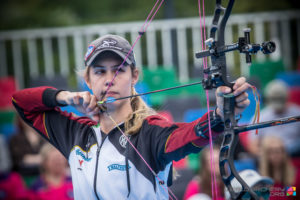
Archery consumables and recycling: nocks, vanes and arrow shafts
Small pieces of archery equipment like vanes and nocks need changing regularly.International archers will shoot somewhere between 50,000 and 100,000 arrows every year. That’s […]



The Centre for Sport and Human Rights is a human rights organisation for the world of sport.
The Centre's role is to work towards a world of sport that fully respects human rights through collective action and through the promotion of the Sporting Chance Principles.
The Centre's aims are threefold:
- Support the prevention of human rights harms from occurring through sport
- Support access to effective remedy where harms have occurred
- Promote a positive human rights legacy from sport and sporting events
Scope
Sport has the power to be a uniting force for good in society in ways little else can. By harnessing this power and acting collectively, the diversity of actors involved in the world of sport have the potential to deliver concrete impacts for those affected by sport.
Through our Advisory Council, the Centre brings together an unprecedented alliance of intergovernmental organisations, governments, sports bodies, athletes, hosts, sponsors, broadcasters, civil society representatives, trade unions, employers and their associations, and national human rights institutions. These organisations have come together united in the understanding that there is a generation of work to be done to fully align the world of sport with the fundamental principles of human dignity, human rights, and labour rights.
The Centre performs a range of activities under a framework of sharing knowledge, building capacity, and increasing accountability. The Centre’s work is rooted in normative international human rights standards. In fulfilling this mandate, the Centre is committed to being independent, principles-based, inclusive, diverse, collaborative, accessible, and trusted.
The Centre is an impartial convenor and a safe space for aligning multi-stakeholder action. Within all activities there is an explicit focus on supporting governments, host actors, sports governing bodies, international federations, and companies. Each has a unique role to play in promoting human rights and implementing their duties and responsibilities to: prevent harms in line with the Sporting Chance Principles, take a clear cross-cutting focus on strengthening access to effective remedies for affected groups, and communicate transparently on progress towards full implementation.
The Centre's work is framed to be responsive to key stakeholders affected by sport – the athletes, communities, workers, volunteers and officials, journalists, and fans – as well as cross-cutting groups that may have particular vulnerabilities – namely, children, human rights defenders, women and girls, LGBTI+ people, people with disabilities, migrants, minority and ethnic groups, indigenous people, and historically disadvantaged communities.
In prioritising action, we consider the severity and likelihood of human rights risks arising, the potential for positive change, and the opportunities to learn, raise awareness, and increase capacity.
History
Launched in June 2018, the Centre is the outcome of many years of work by organisations now represented in its Advisory Council, and a three-year process of collective action through the network that led to the Centre's formation (the Mega Sporting Events Platform for Human Rights (MSE Platform)).
The MSE Platform first convened in November 2015 by the Institute for Human Rights and Business (IHRB), and throughout the next two and a half years demonstrated the value of collective action through a range of concrete activities including producing research, tools, and convening stakeholders in local and global forums to share knowledge, assess progress, and identify challenges.
A commitment to establishing the Centre was made by the MSE Platform’s Steering Committee in a joint statement issued in November 2017, on the occasion of the second Sporting Chance Forum in Geneva.
Governance
The Centre for Sport and Human Rights is chaired by Mary Robinson, former President of Ireland and former UN High Commissioner for Human Rights. The Centre is being incubated as a subsidiary of IHRB before transitioning into a fully independent organisation from 2021.
The Centre is registered as a Charity in the UK (Registered Charity Number: 1187647) and the Trustees are Frances House, Rae Lindsay, and Ron Popper.
During 2020, the Centre is overseen by its Trustees and a Governance Committee for an interim period until a new board of Trustees is appointed from 2021. Trustees will be appointed by the Centre's Advisory Council, which convenes bi-annually to set and monitor the Centre's strategy and impact and to hold the Centre accountable to its mandate.
Information about the Centre’s policies and procedures, including with regard to complaints and grievances is available under policies.
Support
The Centre is exclusively funded by donations from its Advisory Council members and thus relies on donations from a range of sources to implement its work, seeking to balance income from a range of governments, foundations, sports bodies, and companies. Donations from sports bodies and companies go into the Centre’s core funding with no conditions attached. The Centre does not provide any fee-for-service work or paid consultancy.
The Centre is also grateful to receive pro bono support from Clifford Chance LLP.



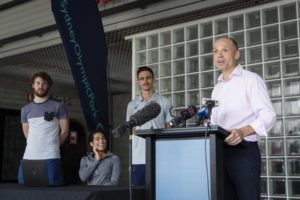
Instalan monitor para medir niveles y calidad del aire
The IAAF has today launched its first air quality monitor in the Southern Hemisphere, at Sydney Olympic Park Athletics Centre in Australia, as part […]




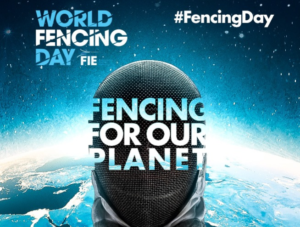
World Fencing Day 2019: Fencing For Our Planet
LAUSANNE, Switzerland, 26 June 2019 – The International Fencing Federation (FIE) is pleased to announce its theme for World Fencing Day 2019 (Saturday, 7 […]





The fencing federations of American Samoa and Samoa, beneficiaries of the 2018 International Fencing Federation (FIE) Donate Your Fencing Gear! program, have actively been developing fencing in their region. As reported by the federations, using the FIE-donated equipment, they have increased numbers of overall fencers as well as enabled experienced athletes to participate in higher-level competitions. The gear received by the Samoan federations included a variety of donations in multiple sizes, including smaller items (that are harder to come by). This has given the federations the ability to offer fencing to younger children, giving them a head-start in becoming successful athletes. The donated equipment has effectively raised the overall safety standards of fencing gear being used in practice and competition.


Game Changer – How climate change is impacting sports in the UK
This report aims to raise awareness of climate change and all it threatens, and encourage people to show their support for action to address it.




Atacama Rally begins its path to Sustainability
After reaching an agreement with the Sustainability commission of the International Motorcycling Federation (FIM), the Atacama Rally 2019 will become the first Cross Country […]


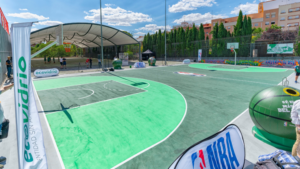
The Madrid City Council, Ecovidrio and the NBA inaugurate the first basketball court renovated with recycled glass
The basketball court located on Calle Embajadores 70, in the Centro district of Madrid, has been opened today to the public with a renewed […]


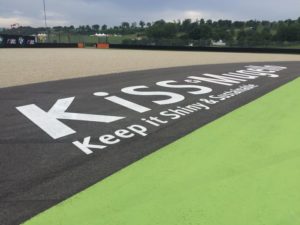
Sustainability on pole in Mugello
As is traditional since 2013, sustainability will be once again in “pole position” at the Italian Motorcycle Grand Prix, sixth round of the 2019 […]



